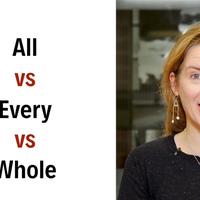What's the difference between 'all', 'every' and 'whole'? - English In A Minute - YouTube
Hi! I'm Georgina from BBC Learning English.
Do you ever wonder about the difference between
'all', 'every' and 'whole'? They all have similar
meanings, but are used in different ways.
'All' means ‘the whole amount of something'.
One hundred per cent. It is often followed
by uncountable nouns or plural nouns.
'He ate all the sugar!' 'All children love sweets'.
'Every' has a similar meaning to 'all'. It means
‘each one without exception'.
'I go to the gym every day.'
'Whole' means ‘the complete amount of something'
and is followed by uncountable nouns or singular
nouns. 'I ate the whole cake'.
'The whole airport is closed'.
Bye for now.

